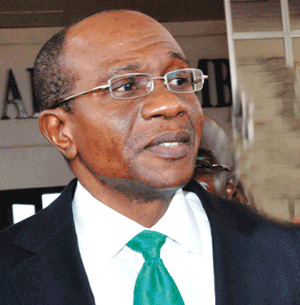Against conventional wisdom, impressive earnings and return on equity (ROE) recorded by most banks quoted on the Nigerian Stock Exchange (NSE) have failed to lift the capital market from bear grip.
Perfect assumption allows increase in capital earnings and ROE to raise expected valuation of stocks in terms of price appreciation.
Despite tight monetary policies imposed by the Central Bank of Nigeria (CBN), many banks recorded impressive financial results with good earnings in the first quarter of 2015.
This is in addition to the 2014 audited financial results in which most banks awarded dividends and bonuses to appreciative shareholders who had ruled out returns on investment in view of regulatory policies that urge banks to plough back profits to beef up capital ratio.
Impressive results by the leading banks – Guaranty Trust Bank (GTBank), Zenith Bank, FBN Holdings, Access Bank, United Bank for Africa (UBA), and First City Monument Bank (FCMB) – aided the NSE Banking Index, which rose 6.92 per cent in the first quarter of 2015 compared with last year.
However, these sterling results failed to get the overall stock exchange performance gauge, the All Share Index (ASI), out of bear grip as the NSE ASI pared -0.16 per cent year-to-date.
It was not surprising that at the close of trading in the first quarter of the year (Q1), the NSE Banking Index jumped 6.92 per cent or 379.97 basis points from 351.4 basis points to 389.37 basis points, which stockbrokers attributed to impressive results by quoted banks.
From N20.71 per share on January 8, the share price of GTBank had risen to N31.80, the highest this year, before it trimmed to N25.00 on March 30.
Zenith also witnessed a surge in share price from N18.41 in Q1 to N20.98, a growth of N2.57 or 14 per cent this year.
FBN Holdings closed at N8.90 per share on March 30, up from N8.00 on January 8, 2015.
GTBank
Buoyed by its latest quarterly earnings after paying mouthwatering dividends for 2014, GTB reported a profit after tax (PAT) of N26.6 billion for Q1 ended March 31, 2015 from N23 billion posted in Q1 2014.
Profit before tax (PBT) rose 17 per cent, from N28 billion to N32.7 billion; gross earnings stood at N79 billion, up 17 per cent from N67.6 billion.
GTBank Managing Director (MD) and Chief Executive Officer (CEO), Segun Agbaje, said: “The major focus for the bank this year is to strengthen market positions with distinctive customer propositions in chosen segments in order to deliver long-term sustainable and efficient growth as well as strong shareholder returns.”
GTB, licensed in August 1990, is the most capitalised stock on the banking sector as of April 29, 2015 with market capitalisation of N832.9 billion.
Zenith Bank
Zenith Bank, the second most capitalised stock on the banking sub-sector, appreciated 14 per cent from N18.41 per share to N20.98 per share on March 31, 2015.
In unaudited financial report for Q1 2015,, the bank declared N27.68 billion profit after tax (PAT) and a rise in profit before tax (PBT) from N28.9 billion in Q1 2014 to N33 billion.
Gross earnings stood at N113 billion, against N94 billion posted in Q1 2014.
Analysts at FBN Capital Research said the bank’s PBT was ahead of their forecast by 13 per cent and PAT by 16 per cent due mainly to the positive surprise on the non-interest income line (47 per cent).
“As such, we would expect a positive reaction by the market to the results,” the analysts added.
Zenith Bank Group Managing Director (GMD) and CEO, Peter Amangbo, said the bank expects positive performance in 2015 because this year “has high prospects of increased economic growth and development, following the successful conduct of general elections in the country.
“This scenario will present the group with ample opportunity to grow its clientele and business volume in Nigeria while consolidating on its gains from foreign subsidiaries.”
According to him, the performance demonstrated the bank’s leadership position, with excellent customer services playing a major role.
Access Bank
Gross earnings rose 19 per cent to N245 billion, compared with N206.98 billion in Q1 2014.
PBT shot 23 per cent to N16.5 billion, from N13.4 billion. PAT grew 18 per cent to N13.66 billion, from N11.6 billion in Q1 2014.
Access Bank GMD, Herbert Wigwe, said the bank’s financial performance in Q1 2015 marked a steady progress towards key strategic objectives.
“Our focus remains on the delivery of sustainable value to our shareholders. We continue to deepen and broaden our top-tier corporate relationships whilst optimising and growing our diverse retail customer base to support low-cost liability growth,” he explained.
Loans and advances recorded a modest growth of 2 per cent to N1.15 trillion in Q1 2015, from N1.12 trillion in December 31, 2014.
Customer deposits of N1.39 trillion slipped 4 per cent from N1.45 trillion in December 2014, caused by run-off of expensive funds and replacement with stable and lower cost deposits.
Total assets improved 2 per cent to N2.14 trillion in Q1 2015 compared to N2.10 trillion in December 2014.
However, the bank which had declared 35 kobo per share dividend for 2014, had its share price dropping at the stock market.
In Q1 2015, the share price dropped from N6.6 to N6.1, representing 50 kobo or 8 per cent depreciation.
FBN Holdings
The shares of First Bank of Nigeria (FBN) Holdings declined 1.1 per cent, from N8.8 per share on January 1, 2015 to N8.7 per share on March 31, 2015.
FBN Holdings recorded gross earnings of N126.8 billion, up 23.5 per cent, against N102.6 billion in Q1 2014.
PBT stood at N26.9 billion in Q1 2015, up 8.7 per cent, from N24.8 billion in Q1 2014, while PAT rose about 5 per cent, from N21.6 billion to N22.6 billion
FBN Holdings Group CEO, Bello Maccido, said the group has sustained its leading position in the financial services industry posting a 23.5 per cent growth in gross earnings at N126.8 billion.
“In spite of the volatile political and macroeconomic environment that has characterised the first quarter,” he stressed, “we returned a profit before tax of N26.9 billion, a 9 per cent increase over the same period in 2014.
“Given this, we are cautiously optimistic about the rest of the year, as the country and economy benefit from improving confidence, and remain focused on managing effectively the macroeconomic challenges.
“We expect improved traction from investments committed in the prior year to diversify revenue streams and enhance profitability. We will continue building a resilient business and drive efficiencies towards delivering sustainable returns to our esteemed shareholders.”
UBA
UBA share has also been upbeat in 2015 with mixed trading by investors following its full year results. The share price dropped almost 6 per cent to N4.06, from the N4.30 it opened with in 2014.
But analysts said UBA has more growth prospects beyond its current price.
Its PBT stood at N18.4 billion in Q1 2015, a jump of 36 per cent above the N13.5 billion in Q1 2014.
PAT rose from N12.6 billion to N16.96 billion, gross earnings grew from N68.1 billion to N83.1 billion.
UBA GMD and CEO, Phillips Oduoza, said the performance was satisfactory, a great start to the year, despite the uncertainty about the economy during the quarter.
He expressed optimism for positive outlook as the bank’s pan-African operations gain critical mass across African markets.
“We remain focused on cross selling initiatives and niche market play, as we remain committed to building a leading pan-African financial services franchise and delivering superior value to our shareholders,” he stressed.
Ecobank
The impressive result Ecobank posted in the 2014 could not translate into share price appreciation perhaps due to failure to offer fair returns to shareholders.
The Share price of the pan-African bank dipped 3.1 per cent, from N18.58 in Q1 2014 to N18.00 in Q1 2015.
PBT rose 58 per cent, from N19.3 billion in Q1 2014 to N31 billion in Q1 2015, PAT jumped 64 per cent, from N14.9 billion to N24 billion.
Gross earnings shot up 21 per cent, from N86.3 billion to N105 billion.
Total assets gained 22 per cent to N4.5 trillion in Q1 2015, against N3.69 trillion on December 31, 2014.
Ecobank Group CEO said for the first three months of 2015, the bank grew profit by N9.6 billion or 64 per cent to N24.5 billion from the same period last year.
He expressed delight at cost efficiency gains which led to cost-income ratio improving to 62.7 per cent from 69.2 per cent in 2014.
Revenue growth was modest, he added, given the seasonally low client-activity seen in Q1 and the currency translation impact experienced.
Essien said the bank maintained adequate levels of capital to support business, and total capital adequacy ratio was 19.4 per cent for Q1 2015 versus 16.1 per cent in Q1 2014.
Overall, he reiterated, the results are reassuring in light of the challenging operating environment, and the bank is proud of the competitive advantage its platform provides and the work its staff continue to do for all stakeholders.















